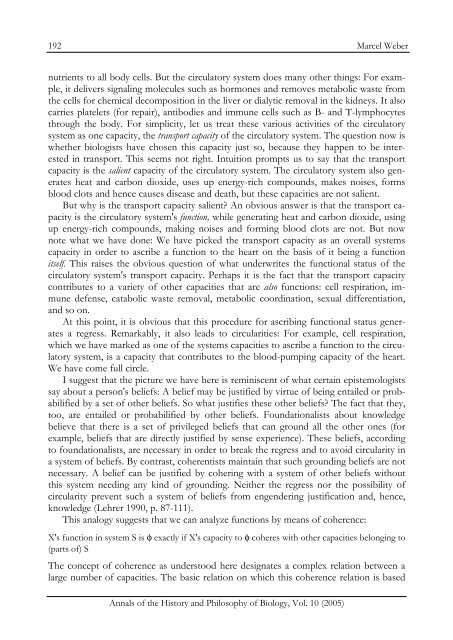Annals of the History and Philosophy of Biology
Annals of the History and Philosophy of Biology
Annals of the History and Philosophy of Biology
Create successful ePaper yourself
Turn your PDF publications into a flip-book with our unique Google optimized e-Paper software.
192<br />
<strong>Annals</strong> <strong>of</strong> <strong>the</strong> <strong>History</strong> <strong>and</strong> <strong>Philosophy</strong> <strong>of</strong> <strong>Biology</strong>, Vol. 10 (2005)<br />
Marcel Weber<br />
nutrients to all body cells. But <strong>the</strong> circulatory system does many o<strong>the</strong>r things: For example,<br />
it delivers signaling molecules such as hormones <strong>and</strong> removes metabolic waste from<br />
<strong>the</strong> cells for chemical decomposition in <strong>the</strong> liver or dialytic removal in <strong>the</strong> kidneys. It also<br />
carries platelets (for repair), antibodies <strong>and</strong> immune cells such as B- <strong>and</strong> T-lymphocytes<br />
through <strong>the</strong> body. For simplicity, let us treat <strong>the</strong>se various activities <strong>of</strong> <strong>the</strong> circulatory<br />
system as one capacity, <strong>the</strong> transport capacity <strong>of</strong> <strong>the</strong> circulatory system. The question now is<br />
whe<strong>the</strong>r biologists have chosen this capacity just so, because <strong>the</strong>y happen to be interested<br />
in transport. This seems not right. Intuition prompts us to say that <strong>the</strong> transport<br />
capacity is <strong>the</strong> salient capacity <strong>of</strong> <strong>the</strong> circulatory system. The circulatory system also generates<br />
heat <strong>and</strong> carbon dioxide, uses up energy-rich compounds, makes noises, forms<br />
blood clots <strong>and</strong> hence causes disease <strong>and</strong> death, but <strong>the</strong>se capacities are not salient.<br />
But why is <strong>the</strong> transport capacity salient? An obvious answer is that <strong>the</strong> transport capacity<br />
is <strong>the</strong> circulatory system's function, while generating heat <strong>and</strong> carbon dioxide, using<br />
up energy-rich compounds, making noises <strong>and</strong> forming blood clots are not. But now<br />
note what we have done: We have picked <strong>the</strong> transport capacity as an overall systems<br />
capacity in order to ascribe a function to <strong>the</strong> heart on <strong>the</strong> basis <strong>of</strong> it being a function<br />
itself. This raises <strong>the</strong> obvious question <strong>of</strong> what underwrites <strong>the</strong> functional status <strong>of</strong> <strong>the</strong><br />
circulatory system's transport capacity. Perhaps it is <strong>the</strong> fact that <strong>the</strong> transport capacity<br />
contributes to a variety <strong>of</strong> o<strong>the</strong>r capacities that are also functions: cell respiration, immune<br />
defense, catabolic waste removal, metabolic coordination, sexual differentiation,<br />
<strong>and</strong> so on.<br />
At this point, it is obvious that this procedure for ascribing functional status generates<br />
a regress. Remarkably, it also leads to circularities: For example, cell respiration,<br />
which we have marked as one <strong>of</strong> <strong>the</strong> systems capacities to ascribe a function to <strong>the</strong> circulatory<br />
system, is a capacity that contributes to <strong>the</strong> blood-pumping capacity <strong>of</strong> <strong>the</strong> heart.<br />
We have come full circle.<br />
I suggest that <strong>the</strong> picture we have here is reminiscent <strong>of</strong> what certain epistemologists<br />
say about a person's beliefs: A belief may be justified by virtue <strong>of</strong> being entailed or probabilified<br />
by a set <strong>of</strong> o<strong>the</strong>r beliefs. So what justifies <strong>the</strong>se o<strong>the</strong>r beliefs? The fact that <strong>the</strong>y,<br />
too, are entailed or probabilified by o<strong>the</strong>r beliefs. Foundationalists about knowledge<br />
believe that <strong>the</strong>re is a set <strong>of</strong> privileged beliefs that can ground all <strong>the</strong> o<strong>the</strong>r ones (for<br />
example, beliefs that are directly justified by sense experience). These beliefs, according<br />
to foundationalists, are necessary in order to break <strong>the</strong> regress <strong>and</strong> to avoid circularity in<br />
a system <strong>of</strong> beliefs. By contrast, coherentists maintain that such grounding beliefs are not<br />
necessary. A belief can be justified by cohering with a system <strong>of</strong> o<strong>the</strong>r beliefs without<br />
this system needing any kind <strong>of</strong> grounding. Nei<strong>the</strong>r <strong>the</strong> regress nor <strong>the</strong> possibility <strong>of</strong><br />
circularity prevent such a system <strong>of</strong> beliefs from engendering justification <strong>and</strong>, hence,<br />
knowledge (Lehrer 1990, p. 87-111).<br />
This analogy suggests that we can analyze functions by means <strong>of</strong> coherence:<br />
X's function in system S is φ exactly if X's capacity to φ coheres with o<strong>the</strong>r capacities belonging to<br />
(parts <strong>of</strong>) S<br />
The concept <strong>of</strong> coherence as understood here designates a complex relation between a<br />
large number <strong>of</strong> capacities. The basic relation on which this coherence relation is based

















